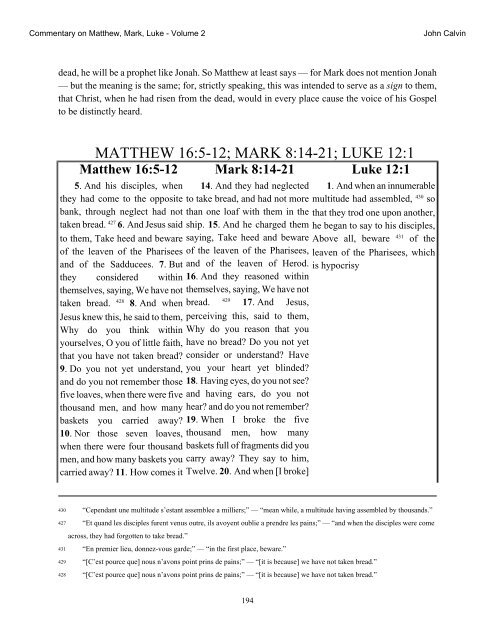Commentary on Matthew, Mark, Luke - Volume 2.pdf
Commentary on Matthew, Mark, Luke - Volume 2.pdf Commentary on Matthew, Mark, Luke - Volume 2.pdf
- Page 149 and 150: Commentary on Matt
- Page 151 and 152: Commentary on Matt
- Page 153 and 154: Commentary on Matt
- Page 155 and 156: Commentary on Matt
- Page 157 and 158: Commentary on Matt
- Page 159 and 160: Commentary on Matt
- Page 161 and 162: Commentary on Matt
- Page 163 and 164: Commentary on Matt
- Page 165 and 166: Commentary on Matt
- Page 167 and 168: Commentary on Matt
- Page 169 and 170: Commentary on Matt
- Page 171 and 172: Commentary on Matt
- Page 173 and 174: Commentary on Matt
- Page 175 and 176: Commentary on Matt
- Page 177 and 178: Commentary on Matt
- Page 179 and 180: Commentary on Matt
- Page 181 and 182: Commentary on Matt
- Page 183 and 184: Commentary on Matt
- Page 185 and 186: Commentary on Matt
- Page 187 and 188: Commentary on Matt
- Page 189 and 190: Commentary on Matt
- Page 191 and 192: Commentary on Matt
- Page 193 and 194: Commentary on Matt
- Page 195 and 196: Commentary on Matt
- Page 197 and 198: Commentary on Matt
- Page 199: Commentary on Matt
- Page 203 and 204: Commentary on Matt
- Page 205 and 206: Commentary on Matt
- Page 207 and 208: Commentary on Matt
- Page 209 and 210: Commentary on Matt
- Page 211 and 212: Commentary on Matt
- Page 213 and 214: Commentary on Matt
- Page 215 and 216: Commentary on Matt
- Page 217 and 218: Commentary on Matt
- Page 219 and 220: Commentary on Matt
- Page 221 and 222: Commentary on Matt
- Page 223 and 224: Commentary on Matt
- Page 225 and 226: Commentary on Matt
- Page 227 and 228: Commentary on Matt
- Page 229 and 230: Commentary on Matt
- Page 231 and 232: Commentary on Matt
- Page 233 and 234: Commentary on Matt
- Page 235 and 236: Commentary on Matt
- Page 237 and 238: Commentary on Matt
- Page 239 and 240: Commentary on Matt
- Page 241 and 242: Commentary on Matt
- Page 243 and 244: Commentary on Matt
- Page 245 and 246: Commentary on Matt
- Page 247 and 248: Commentary on Matt
- Page 249 and 250: Commentary on Matt
<str<strong>on</strong>g>Commentary</str<strong>on</strong>g> <strong>on</strong> <strong>Matthew</strong>, <strong>Mark</strong>, <strong>Luke</strong> - <strong>Volume</strong> 2<br />
dead, he will be a prophet like J<strong>on</strong>ah. So <strong>Matthew</strong> at least says — for <strong>Mark</strong> does not menti<strong>on</strong> J<strong>on</strong>ah<br />
— but the meaning is the same; for, strictly speaking, this was intended to serve as a sign to them,<br />
that Christ, when he had risen from the dead, would in every place cause the voice of his Gospel<br />
to be distinctly heard.<br />
MATTHEW 16:5-12; MARK 8:14-21; LUKE 12:1<br />
<strong>Matthew</strong> 16:5-12<br />
<strong>Mark</strong> 8:14-21<br />
<strong>Luke</strong> 12:1<br />
1. And when an innumerable<br />
multitude had assembled, 430 5. And his disciples, when 14. And they had neglected<br />
they had come to the opposite to take bread, and had not more<br />
so<br />
bank, through neglect had not than <strong>on</strong>e loaf with them in the that they trod <strong>on</strong>e up<strong>on</strong> another,<br />
taken bread. ship. 15. And he charged them<br />
427 6. And Jesus said he began to say to his disciples,<br />
to them, Take heed and beware saying, Take heed and beware Above all, beware 431 of the<br />
of the leaven of the Pharisees of the leaven of the Pharisees, leaven of the Pharisees, which<br />
and of the Sadducees. 7. But and of the leaven of Herod. is hypocrisy<br />
they c<strong>on</strong>sidered within 16. And they reas<strong>on</strong>ed within<br />
themselves, saying, We have not themselves, saying, We have not<br />
429<br />
taken bread. bread. 17. And Jesus,<br />
428 8. And when<br />
Jesus knew this, he said to them, perceiving this, said to them,<br />
Why do you think within Why do you reas<strong>on</strong> that you<br />
yourselves, O you of little faith, have no bread? Do you not yet<br />
that you have not taken bread? c<strong>on</strong>sider or understand? Have<br />
9. Do you not yet understand, you your heart yet blinded?<br />
and do you not remember those 18. Having eyes, do you not see?<br />
five loaves, when there were five and having ears, do you not<br />
thousand men, and how many hear? and do you not remember?<br />
baskets you carried away? 19. When I broke the five<br />
10. Nor those seven loaves, thousand men, how many<br />
when there were four thousand baskets full of fragments did you<br />
men, and how many baskets you carry away? They say to him,<br />
carried away? 11. How comes it Twelve. 20. And when [I broke]<br />
430 “Cependant une multitude s’estant assemblee a milliers;” — “mean while, a multitude having assembled by thousands.”<br />
427 “Et quand les disciples furent venus outre, ils avoyent oublie a prendre les pains;” — “and when the disciples were come<br />
across, they had forgotten to take bread.”<br />
431 “En premier lieu, d<strong>on</strong>nez-vous garde;” — “in the first place, beware.”<br />
429 “[C’est pource que] nous n’av<strong>on</strong>s point prins de pains;” — “[it is because] we have not taken bread.”<br />
428 “[C’est pource que] nous n’av<strong>on</strong>s point prins de pains;” — “[it is because] we have not taken bread.”<br />
194<br />
John Calvin



